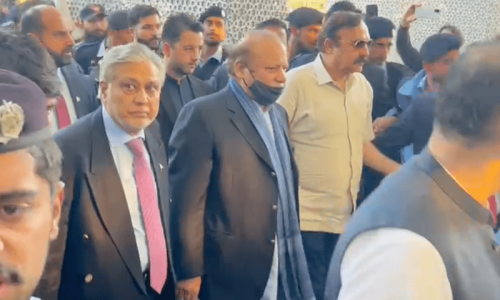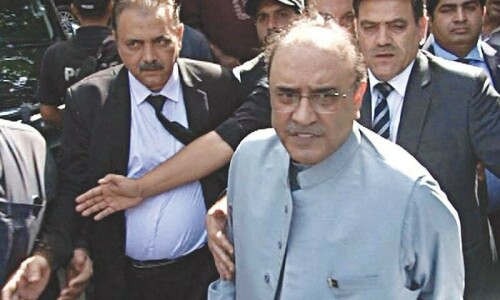The National Accountability Bureau (NAB) on Wednesday gave a clean chit to former prime minister Nawaz Sharif in the Toshakhana vehicle reference.
The Toshakhana is a government department that stores gifts given to rulers, parliamentarians, bureaucrats and officials by heads of other governments, states, and foreign dignitaries.
According to the case filed by NAB, then-prime minister Yousaf Raza Gilani, in order to extend illegal benefits to Nawaz and then-president Asif Ali Zardari, allegedly allowed the retention of vehicles gifted to them by different foreign states and dignitaries by relaxing procedures related to the submission of gifts in the Toshakhana.
The accused, “through dishonest and illegal means for their personal benefit and interest”, retained the vehicles in question “against a nominal payment of 15 per cent of the total value”, the reference stated.
In June 2020, an accountability court had issued non-bailable arrest warrants for the PML-N supremo, who had skipped hearings because he had begun his self-imposed exile in London. Months later, Nawaz had challenged the warrants in the Islamabad High Court but withdrew the petition days later.
On Sept 10, 2020, the ex-premier was declared a proclaimed offender in the case, with an accountability court initiating the process to confiscate his properties and directing the accountability watchdog to make his arrest through Interpol.
Ahead of his return to Pakistan in October last year, an accountability court had suspended the perpetual arrest warrants issued in 2020 for the ex-premier in the case. The PML-N supremo was granted bail days later.
In November, the NAB informed a Lahore accountability court that it had recorded Nawaz’s statement in the reference.
Last month, after he was elected as the president, Zardari’s lead counsel Farooq H. Naek told Dawn that the president, who had filed for immunity in two other graft cases, also intended to extend the claim to two other cases, including the Toshakhana reference.
Today, the NAB submitted a report to an Islamabad accountability court following its orders to have Nawaz join the investigation.
According to the report, a copy of which is available with Dawn.com, the vehicle concerned was gifted to then-PM Nawaz by the government of Saudi Arabia in 1997 and was submitted in the Toshakhana.
It added that later, the car was included in the federal transport pool. In 2008, then-premier Gilani had offered Nawaz to buy the car, at which the latter did so from the federal transport pool and not the Toshakhana, the NAB report said.
“This case may attract any other offence but it has no relevancy with the benefit of Toshakhana as the subject vehicle when purchased was not part of Toshakhana, rather than the same was part of the federal transport pool,” it said.
It stated that Nawaz had not made the payment for the vehicle from a fake bank account, reiterating that the car was not a part of the Toshakhana valuables when Nawaz bought it.
Subsequently, the NAB urged the accountability court to acquit or discharge the former premier from the reference.














































Dear visitor, the comments section is undergoing an overhaul and will return soon.